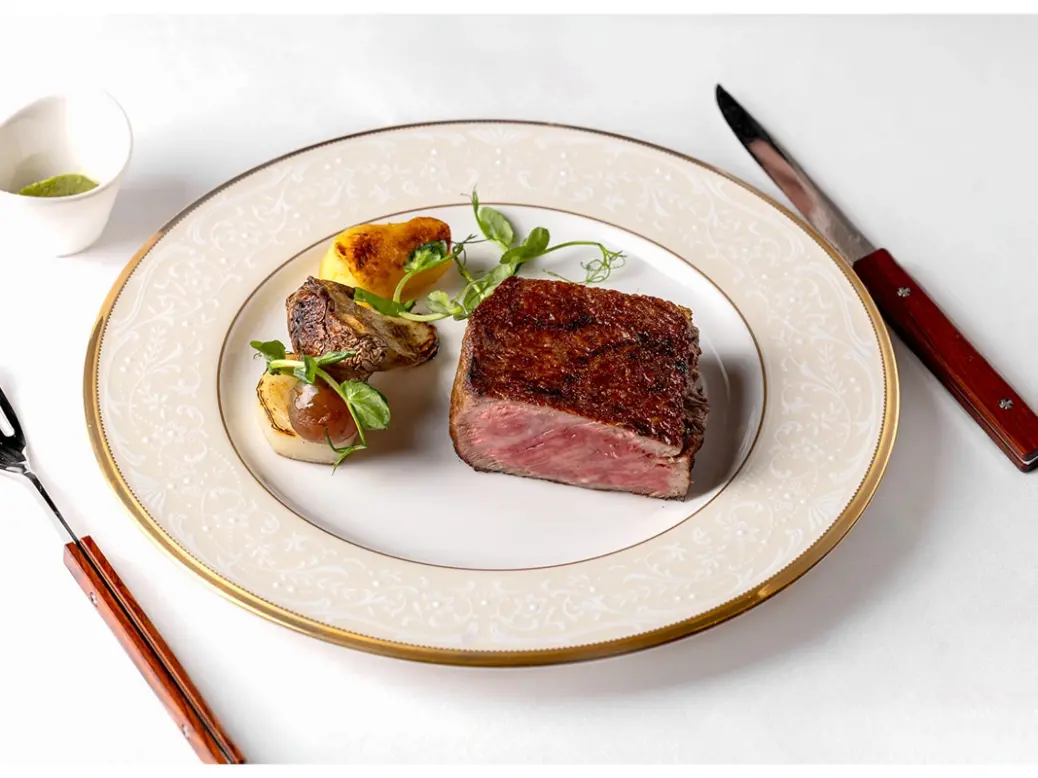
Behind a discreet door on Clarges Street in Mayfair, a small dining room is showing an opulent, wildly expensive path for the future of meat. Aragawa might have the luxurious hidden feel of a high-class speakeasy, but in some ways this is more like a temple to beef.
[See also: Best restaurants in Mayfair]
This is the only place outside Japan where you can eat Tajima beef, the rarest of the rare, a product that makes Kobe look pedestrian. It is the first international outpost of owner Kotaro Ogawa’s Tokyo original, which has been delighting diners and horrifying their bank managers since 1967.
The London branch opened towards the end of last year and generated media attention thanks to its prices: £700 for 400g of rump, £760 for 350g of fillet. If there is a more expensive piece of flesh in the Western hemisphere, it is not publicly listed.
The experience at Aragawa is delightfully Japanese, a celebration of craft and provenance so particular that it is difficult to imagine coming from any other country. As far as one can tell, these cows have not only led better lives than most other cows, but most other people, too. The sourcing of the beef varies with the time of year. A 400g, 29-month sirloin hails from the Matayoshi farm, RRP £600. There’s a 350g fillet from the Okazaki farm, £760. If you are planning a visit, you may be reassured that the steaks are designed to be shared and can be cooked ‘to your preferred taste’. The chef is Kazuo Imayosh, who has been with Ogawa in Tokyo for 40 years, who cooks in a charcoal kiln and claims to be able to judge his meat by sound.
[See also: Inside the Port Ellen ‘ghost distillery’ as it reopens after 40 years]
‘We’ve had the headlines of how expensive we are,’ says guest relations manager Stephen Williams. ‘But that is because of the product we have. It’s different from anything else. If you walk away from here and have had an experience and a lasting memory, that’s more important to us.’
Steak is perpetually defying rumours of its demise. Had you taken a survey at any point in the past 50 years, it would have seemed a dish with a looming expiry date. Fatty, carbon-intensive, expensive: bad for you, bad for the cow, and bad for the planet.
Films such as Cowspiracy have highlighted the destructive power of intensive beef farming. The global mean emissions for one kilogram of beef from non-dairy beef herds is 100 kilograms of CO2, according to Our World in Data. It has four times the footprint of chicken, and 10–100 times as much as plant-based food. Cows are big, expensive, methane-producing beasts that use huge amounts of water. On the face of things, it would be hard to invent a meat less suitable for a blockbuster launch in 2024.
A cut above
Yet Aragawa is not the only restaurant bucking the trend. No mention of hyper-expensive meat would be complete without a nod to Nusr-Et, Salt Bae’s international chain of preposterous oligarch bait. When it opened in London, its signature was a 2kg tomahawk covered in gold leaf and priced at £1,450. There are more than 20 Nusr-Et restaurants, which showcase their founder’s taste-appalling, Instagram-pleasing signature dishes. The gold leaf has gone from the tomahawk, but the lofty prices endure. Sniffy reviews, such as the Evening Standard’s, which called it a ‘vibeless business lounge of a room where mostly amateurish Frankie & Benny’s-level food is served at insultingly high prices’, appear to have done little to deter customers. Its most recent results reported a 44 per cent increase in profits, at a time when many other restaurants are closing.
Aragawa would be loath to be mentioned in the same breath as Nusr-Et, but its prices prohibit anything else. Even at less vertiginous price points, steak rumbles on. British steak chain Hawksmoor is expanding into America (culinary coals to Newcastle), adding Chicago later this year to its successful branch in New York. The US is enjoying a new golden age of steakhouses, with chefs and restaurateurs mixing international flavours with the classic tradition to create a new wave: think of Cote (no, not that one), the Korean steakhouse with branches in Miami and New York City, or Carne Mare, where Italian-inflected steaks include a gorgonzola-cured Wagyu T-bone.
[See also: Ingenious ‘infinity wheel’ gives Rémy Martin Louis XIII decanters a second life]
‘There’s something deeply baked into our culture about cooked meat,’ says Will Beckett, co-founder of Hawksmoor. ‘A key part of evolution was learning that by sticking meat over fire we could get more calories and protein and therefore our brains could get on with more interesting stuff. Then steak is part of national culture, too: for the Americans, the French, the Japanese, us. It’s a massive thing culturally.’ (As if to prove his point, the Rest Is History podcast just did a whole episode on the beef of old England, pointing out that for us Rosbifs the bloody waters run deep.)
‘Finally, steak has been through a lot of economic and fashion cycles,’ he adds. ‘At the top of the economic cycle, it’s celebratory, a way to show off how much money you have. But when things are a bit tough, it’s reassuring, too. It’s social, something people go out and do together.’
Land of the free, home of the steak
While at the broader level beef has continued to lose ground to leaner meats, particularly chicken, the market for high-end steak seems remarkably resilient. Tim Hayward, FT restaurant critic and author of Steak, an upcoming book on the subject, sees most steak trends evolving in response to American dominance. Where other countries have traditions of grass-fed steak cattle, the US-approved, corn-fed method is slowly taking over worldwide, to satisfy American standards.
‘I had this plan to go around countries like Argentina, Japan and Korea to sample their steaks, but in the two years I’ve been researching the book, basically everyone has gone over to the USDA [US Department of Agriculture] model, which drives me up the wall,’ Hayward says. USDA approved steak is an interchangeable international standard, which makes it easier for US farmers to commoditise, but at the cost of individual quirk and provenance in the meat. By and large, American steaks are great corn-fed hulks, which can be beautifully tender but lack some of the beefiness of the older European steaks.
[See also: London restaurants win big in Michelin Guide Great Britain & Ireland 2024]
‘The British are pretty much the last farmers in the world still grass-rearing their meat,’ says Hayward. ‘The American market has people completely converted to the notion of tenderness and that the flavour is in the fat. The flavour isn’t in the fat – it’s just that they make fat beef.’
He argues, too, that beef has a sustainable place in the food chain. ‘The environmental impact [of beef], which is vast, is from intensive farming, which is not a problem we have in the UK,’ he says. ‘Don’t get me wrong, I’m keen people should eat a lot less meat, but what they should be eating is high-quality, well-reared steak. I think that’s why steak has taken off. If you want beef, you want it at that top level. It should be more special, not less so.’
The art of Aragawa
At Aragawa, it is certainly special. The meat sits in the charcoal-fired kiln for just long enough that its exterior is charred a deep, even brown, seasoned only with salt and pepper, the crust a model of the Maillard reaction. Inside, the meat blooms, the colour a soft, even pink, juices gleaming. Each bite is a symphony of fat and muscle. My desire to get as much of it into my mouth as fast as I can is tempered by an equally powerful desire to make each mouthful last as long as possible.
[See also: The legacy of Le Gavroche: Michel Roux Jr reflects on the eve of its closure]
It may be why Aragawa, eye-watering as its prices are, feels less distasteful than other examples of oligarchical excess. The restaurant has introduced a lunch menu to help lure new customers: £250 for two courses or £260 for three. A staff member tells me they lose money at those prices, but they are using it in the hope of drawing customers back for the main event.
These are animals raised with love and care, prepared by masters and served with exceptional attention to detail. There will be those who argue that no restaurant should charge this much, but in offering a glimpse of a world where the life of an animal is truly respected, Aragawa is showing one path to the future. If you believe in eating meat at all, you should believe in the £700 steak.






